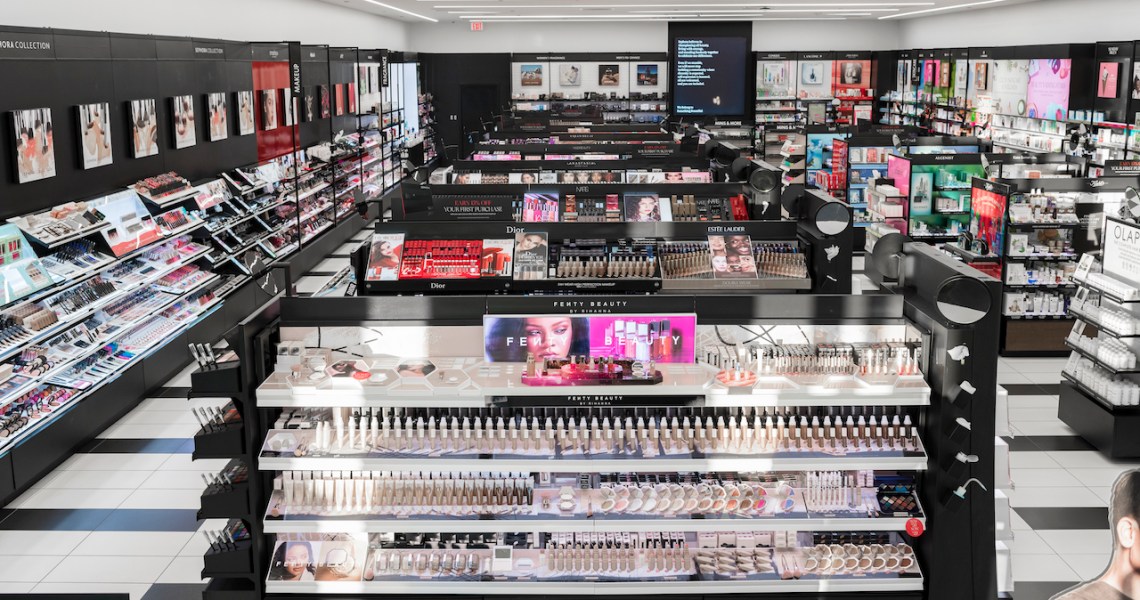Beauty retailers continue to adjust to the new brick-and-mortar reality.
Shortly after Ulta opened 180 stores on May 11 (and launched curbside pick-up in more than 700 locations), Sephora announced on Tuesday that it will open 70 stores across 13 states including Arizona, Colorado, Indiana, Texas and Georgia beginning May 22. In said locations, the company will implement its new Sephora Health and Hygiene safety standards, which include 12 guidelines such as requiring employee temperature checks before and during shifts, featuring display-only product testers and limiting shoppers. Sephora will not be offering curbside pick-up, likely due to its mall-centric location structure versus having standalone stores.
Jean-André Rougeot, president and CEO of Sephora Americas, said in a statement to Glossy that the company is embracing “what we can control.”
“We are taking an intentionally measured and phased approach to re-opening, putting the priority on the health and safety of our communities … We will follow guidance from the CDC, government and health authorities, in tandem with extensive supplemental safety measures, to formalize our new Sephora Health and Hygiene Guidelines, that safeguard the in-store shopping experience,” his statement said.
Sephora’s guidelines mirror Ulta’s in many ways, but offer greater clarity around sampling, in that samples will be “limited to commercially pre-packaged samples” and quantities will vary by store. Sephora has also not begun services, which Ulta has, by appointment. Ulta’s services guidelines include “required face coverings for guests and associates, gloves for associates, increased laundering of capes and aprons, staggered stations to support social distancing, and added sanitization processes.”
Other beauty retailers are beginning to map out their own re-open plans, including Bluemercury and department stores that carry beauty, such as Saks Fifth Avenue and Macy’s. So there is an opportunity for retailers in the beauty space to create an industry-wide set of best practices. This would be a way to ensure that if retailers make the decision to open stores, customers will come.
“From the backend, I think it’s going to be a bit of a mess for a while when managing a brand, whether the brand is a retailer or if the brand is a product brand,” said Jodi Katz, founder and creative director of Base Beauty Creative Agency. “I haven’t heard of true leadership, and it seems like there is a need for a coalition to certify hygiene in retail environments.”
In the last two months, many beauty brand founders and CEOs, such as Beautycounter’s Gregg Renfrew and RéVive’s Elana Drell-Szyfer, have mentioned working groups they’ve joined to manage coronavirus-related issues that are hosted by CEW and BeautyUnited. The National Retail Federation has instituted its own set of guidelines for U.S.-wide store re-openings that promote contactless curbside pick-up, in-home delivery, social distancing and reduced occupancy. But Katz recommended that beauty retailers take a page from Disney World’s parks, where employees can always be found mopping floors or picking up trash to support cleanliness. Customers are less likely to want a sales associate interacting with them today, but will be reassured by extra sanitization measures, she said.
Though somewhat helpful, NRF’s terms don’t begin to address beauty-specific issues like product trial and testing. This is something that competitors including Sephora and Ulta could lead — especially since brands are carried in both places.
As product testers remain for display-only, but not necessarily behind plexiglass, retailers will need to re-train customers who may not have been affected by Covid-19 to not pick up a lipstick or foundation. That’s especially true because an April 2020 survey conducted by Base Beauty Creative Agency found customers’ responses to trial and sample questions to range from “I now have no desire to test in-store products, knowing someone else touched it,” to “You never know where the next virus can stem from.'”
“Reorganizing the stores to support a shopping style that is brand new is going to be hard, but retailers need to think about having bars that are totally hygienic, where a customer could go up and say, ‘I want these four different foundations,’ and they would get an alert on an app, pick-up the samples and then play with them themselves,” said Katz. “That satisfies animation and play, but it’s safe. But it would require rethinking the entire beauty store format to support a new kind of customer behavior.”




